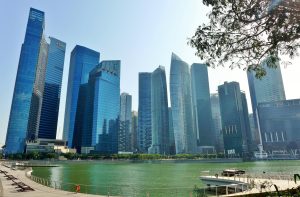– Singapore overtakes Hong Kong as Asia-Pacific’s top source for outbound capital
– China becomes a net importer of capital between Q1 2018 and Q1 2019
– Cross-border investors target specialist property types and fringe locations
Knight Frank, a global property consultancy company, today launched the 2019 edition of its flagship report, Active Capital. The report delves into the sources and destinations of cross-border investments in commercial real estate and highlights five themes shaping the next phase of global real estate investment: late cycle investing, capital gravity, the reinvention of capital, ‘nownership’ and the value of data.

Asia-Pacific outbound capital
In the last 12 months, total outbound capital from Asia Pacific dropped 34% (from US$88bn to US$57bn), coming in third behind North America (US$110bn) and Europe (US$104bn), due in part to the significant fall in outbound capital from China.
In the same period, Singapore overtook Hong Kong, recording a 23% increase in outbound capital.
Table of Contents
According to the report, Singapore has already invested more than US$4 billion into China, South Korea, the UK and Australia in Q1 2019, reflecting several landmark cross-border deals.
Asia-Pacific cross-border capital outflows by source*
Market |
12 months to Q1 2018 (US$ bn) | 12 months to Q1 2019 (US$ bn) | % Change
|
||||
| Singapore | 17.1 | 21.8 | 23% | ||||
| Hong Kong | 18.2 | 11.4 | -37% | ||||
| South Korea | 8.7 | 8.9 | 2% | ||||
| China | 34.5 | 5.7 | -83% | ||||
| Japan | 2.6 | 4.0 | 51% | ||||
| Malaysia | 0.8 | 1.0 | 34% | ||||
| Australia | 2.0 | 1.0 | -49% | ||||
| Taiwan | 1.8 | 0.8 | -52% | ||||
| India | 0.3 | 0.7 | 92% | ||||
| Thailand | 0.5 | 0.4 | -27% | ||||
| Source: Knight Frank/RCA *excluding development sites | |||||||
Neil Brookes, Asia-Pacific Head of Capital Markets, Knight Frank, said, “The steep decline in Chinese outbound capital is largely attributed to capital controls imposed by the government to prevent money flowing offshore and is expected to stay in place until 2020 at least.”
“In the past 12 months, outbound capital from Asia-Pacific, and Singapore in particular, has sought out alternative asset classes in Western markets while reducing their exposure to retail assets in the region, previously thought of as a core asset class,” he added.
Asia-Pacific inbound capital
Between Q1 2018 and Q1 2019, China was a net importer of capital and Asia Pacific’s largest recipient of cross-border capital, edging ahead of Australia. South Korea was the only other Asian entrant in the top 10 destinations globally for cross-border investment.
Top 10 routes of cross-border capital into Asia Pacific
| Destination Market
|
12-months to Q1 2018 (US$ bn)
|
12-months to Q1 2019 (US$ bn)
|
% Change
|
| Mainland China | 9.1 | 14.3 | 56% |
| Australia | 11.2 | 13.1 | 17% |
| South Korea | 2.3 | 5.7 | 147% |
| Japan | 11.7 | 4.3 | -64% |
| Singapore | 2.6 | 3.9 | 49% |
| Hong Kong | 8.1 | 3.9 | -52% |
| India | 3.9 | 2.6 | -34% |
| Taiwan | 0.0 | 1.2 | 7218% |
| New Zealand | 0.9 | 1.2 | 31% |
| Malaysia | 0.6 | 0.7 | 18% |
Source: Knight Frank/RCA
Brookes said, “China’s maturing market has been a target, not only forSingaporean investors but for US private equity and Hong Kong-based capital. While Tier-1 markets continue to attract the lion’s share of capital, some investors are exploring dynamic Tier-2 markets.”
Into extra time
The report discusses the implications for real estate investors in the late cycle environment, arguing that many markets will not see returns hit recent highs.
“With ongoing trade tensions and heightened economic uncertainties, many Asia-Pacific central banks have opted for a more dovish stance on their monetary policies as economies start decelerating. In the past six months alone, five Asia-Pacific central banks have cut their benchmark interest rates following weaker than expected Q1 2019 GDP growth,” said Nicholas Holt, Asia-Pacific Head of Research, Knight Frank.
“While this will support real estate pricing, given the stage in the cycle, investors searching for higher returns are increasingly pivoting towards alternative assets and fringe markets,” Holt added.
Purpose-built student accommodation (PBSA)
One of the specialist sectors highlighted in the report, purpose-built student accommodation (PBSA), has attracted high volumes of cross-border investment over the last three years, as university student numbers hit record levels globally.
Outbound investment from Asia-Pacific markets into UK student property has risen by 47% in the last five years, according to RCA data compiled by Knight Frank. In April, Singapore Press Holdings (SPH) added £133.7 million worth of assets to its UK student property portfolio, increasing its portfolio by 1,243 beds to 5,059 beds across 20 assets in 10 cities.
Emily Fell, Director, Capital Markets, Knight Frank Asia Pacific, said, “The majority of investors based in Asia-Pacific who are looking to invest in PBSA are heavily weighted in traditional asset classes in their home region and are now looking to divest to other locations and sectors. To gain an immediate platform, large scale portfolios are at the top of the requirement list, hence the big jump in cross-border investment in recent years. Last year volumes fell back, though investors from Asia were under-bidders on several large transactions.
“Consequently, we expect that the level of interest from Asia-Pacific for regional portfolios around the world will continue to rise. However, if yields compress further, it may become difficult to meet return hurdles. This could mean that groups focus their attention on opportunities further up the risk curve.
“For institutional capital in Asia, PBSA in the UK represents a stable and recurring income which delivers attractive returns relative to traditional global assets classes. The sector is also seen as having performed well during economic downturns.”
How to Secure a Commercial Loan Quickly
Are you planning to capitalise on the uptrend of Singapore’s commercial sector but unsure of funding for investment? Don’t worry because iCompareLoan mortgage brokers can set you up on a path that can get you a commercial loan in a quick and seamless manner.
Alternatively you can read more about the Best Commercial Loans in Singapore before deciding on your next purchase. Our brokers have close links with the best lenders in town and can help you compare Singapore’s best commercial loans and settle for a loan package that best suits your commercial purchase needs.
Whether you are looking for a new commercial loan or for a refinancing package for your commercial properties, our brokers can help you get everything right from calculating mortgage repayment, comparing interest rates, all through to securing the best commercial loans which fits your profile. And the good thing is that all our services are free of charge. So it is all worth it to secure the best commercial loans through us.
You may contact us today for advice on a new commercial loan or refinancing advice, or for Personal Finance advice.
You may also speak to our Panel of Property agents.






